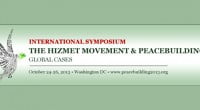Detained Turkish Journalists Follow Teachings of US-based Preacher
Date posted: December 19, 2014
JEROME SOCOLOVSKY
When around 20 journalists in Turkey from the Zaman newspaper and Samanyolu TV were detained earlier this week because of ties to a U.S.-based Turkish preacher, a supposedly official arrest list that included additional names was circulated via Twitter.
At the time, Kerim Balci of the Zaman-affiliated Turkish Review was flying to the U.S. for a previously-scheduled conference.
“When I stepped down to Chicago I started receiving messages from my friends all over the world who said, ‘We saw your name on the list of people to be arrested.’ ‘We are praying for you.’ And so on,” he told VOA.
The government’s raids on opposition media have sparked international condemnation and are being seen as an effort to undermine a religious movement led by preacher Fethullah Gulen. Gulen lives in near seclusion in the U.S. but has a vast following in Turkey.
Gulen’s “Hizmet” movement is based on a religiously conservative view of Islam, as is President Recep Tayyip Erdogan’s Justice and Development Party, and Gulen initially joined the man who is now president in opposing Turkey’s previous secular establishment.
But in the past year Hizmet sympathizers have accused the president of authoritarianism, and objected in particular to foreign policies supportive of Islamists in the Middle East such as the Muslim Brotherhood in Egypt.
One year ago, a corruption investigation implicated the President’s family and inner circle.
Kerim Balci said journalists who support Gulen have been aggressively reporting on Erdogan because his words and actions tarnished all Muslims.
“If you are using the language of Islam and then if you are a corrupt person, you are actually corrupting my religion, and I have all the right to say, ‘Stop! This is not religion. This is not Islam,’” Balci added.
Erdogan denies the corruption allegations and has described them as the work of a “parallel state.” After this week raids, he issued a veiled threat against Gulen’s supporters.
“Those who try to get involved in dirty business and dirty relations with the hope of returning Turkey to its old days should realize that they will not be successful and give up as soon as possible,” the president said.
Since 1999, Gulen has lived at a retreat in Pennsylvania’s Pocono Mountains.
“He has very poor health,” said Turkish-American businessman Alp Aslandogan, a close associate who spent time with the preacher several days ago.
Despite the events in Turkey, Aslandogan said Gulen kept to his routine, for the most part.
“He spends quite a bit of his time in personal supplications, quranic recitation, editing his works that are to be published,” Asladogan said, “He’s praying a lot these days.”
On Tuesday, State Department spokeswoman Jen Psaki expressed concern about the detentions. “As Turkey’s friend and NATO ally, we urge the Turkish authorities to ensure their actions uphold Turkey’s core values and democratic foundations.”
However, she declined to answer a Turkish journalist’s question focused on Gulen, whom Turkey wants the U.S. government to extradite.
*Jerome Socolovsky is the award-winning religion correspondent for the Voice of America, based in Washington. He reports on the rapidly changing faith landscape of the United States, including interfaith issues, secularization and non-affiliation trends and the growth of immigrant congregations.
Source: Voice of America , December 17, 2014
Tags: Democracy | Freedoms | North America | Peacebuilding | USA |
























